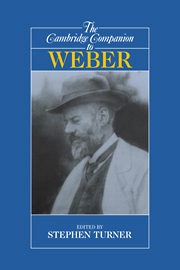Book contents
- Frontmatter
- Introduction
- PART I RATIONALITY, RATIONALIZATION, AND PSYCHOLOGY
- PART II POLITICS AND CULTURE
- 4 The rule of man over man: politics, power and legitimation
- 5 Weber on the cultural situation of the modern age
- 6 Global capitalism and multi-ethnicity: Max Weber then and now
- 7 Constitutional Caesarism: Weber’s politics in their German context
- PART III RELIGIONS AND THEIR ECONOMIC ETHICS
- PART IV LAW AND ECONOMICS
- Further reading
- Index
6 - Global capitalism and multi-ethnicity: Max Weber then and now
from PART II - POLITICS AND CULTURE
Published online by Cambridge University Press: 28 May 2012
- Frontmatter
- Introduction
- PART I RATIONALITY, RATIONALIZATION, AND PSYCHOLOGY
- PART II POLITICS AND CULTURE
- 4 The rule of man over man: politics, power and legitimation
- 5 Weber on the cultural situation of the modern age
- 6 Global capitalism and multi-ethnicity: Max Weber then and now
- 7 Constitutional Caesarism: Weber’s politics in their German context
- PART III RELIGIONS AND THEIR ECONOMIC ETHICS
- PART IV LAW AND ECONOMICS
- Further reading
- Index
Summary
We live in an era of capitalist globalization and renewed ethnic conflicts. Universalist and particularist forces contend with one another. In this setting capitalism and ethnicity can be connected positively as well as negatively. I would like to reconsider Max Weber's views about the relations between nation-state and ethnic groups (nationalities) and between various kinds of capitalism and ethnicity. I would like to suggest that some of his theoretical and policy statements remain useful for illuminating: 1, the persistence of modern and traditional components in contemporary capitalism; 2, the multi-ethnic components of capitalism; 3, the course of capitalism, democracy and ethnicity in Russia and eastern Europe.
Introduction
The present globalization of capitalism, which is facilitated by electronification, should not make us overlook that only recently have we attained again the level of world market integration that existed before 1914. This makes that period, as well as Weber's theoretical and practical understanding, particularly suitable for a comparison. The integration of the world market remained intact until August 1914 in spite of nationalism and imperialism, tariff barriers and “protection of national labor” because Great Britain in particular kept its markets open. Only recently have we entered again a new era of free mobility and easy availability of capital, information and personnel. A new cosmopolitan elite is emerging at the apex of tremendous international migration.
- Type
- Chapter
- Information
- The Cambridge Companion to Weber , pp. 117 - 130Publisher: Cambridge University PressPrint publication year: 2000
- 4
- Cited by



